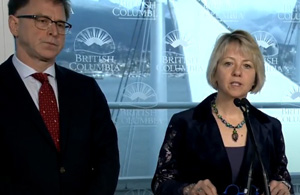
Saturday February 29, 2020 ~ VICTORIA, BC
by Mary Brooke ~ West Shore Voice News
Although it’s Saturday, the developments around the spread and anagement of the novel coronavirus (COVID-19) has not subsided.
This morning US President Donald Trump highlighted the professional work of the US Centres for Disease Control (CDC) — including the expectation that the disease will spread but is being contained, and announced a travel ban to areas of high infection in Iran, South Korea and Italy.
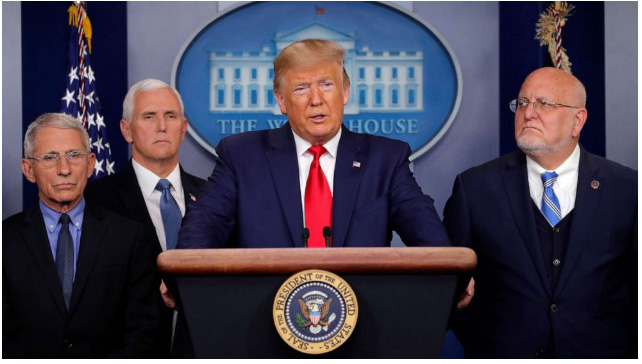
Trump stated on live TV that there has been one death (a woman in Washington State who has no travel-history or known connection to travllers). “Unfortunately, one patient passed away overnight,” he said, surrounded by US CDD leadership and Vice-President Mike Pence.
This case is notable for resulting from ‘community spread’, i.e. not being directly related to known contact with someone who has travelled from high-infection regions of the world.
“Healthy individuals should be able to fully recover,” Trump added. as of February 28, the World Health Organization (WHO) in their daily report shows 62 confirmed cases of COVID-19 in the USA, reportedly now 66.
There are 16 known cases of COVID-10 in Canada. A few days ago, Air Canada suspended all direct flights from Vancouver, Montreal and Toronto airports to mainland China until April 10. But flights coming in from areas around the globe have not been blocked by the federal government. The eighth case of COVID-19 in BC as announced today resulted from someone visiting in Vancouver from Iran. There have been no COVID-19-related deaths in Canada so far.
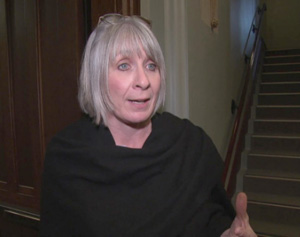
In Canada, federal Health Minister Patty Hajdu’s statement to media on February 27 set the lead, i.e. that people should be prepared for the possibility of having to prepare with adequate supplies for in-home isolation for up to 14 days.
“There’s no magic to this,” said Minister Hajdu. “It’s really about first of all making sure you have enough supplies, if someone in your family becomes ill, if you yourself become ill, that you have what you need to survive a week or so without having to go out.” That essentially means adequate food supply, enough essential medications for existing conditions, and arrangements for working from home as required, or perhaps child care arrangements and elderly care arrangements.
BC is starting to ease into their preparedness messaging for a lengthy stay at home (as similar to preparation for a snowstorm or extended power outage). And today at a news conference in Vancouver, Public Health Officer Dr Bonnie Henry said about the COVID-19 situation: “This is a rapidly evolving situation”.
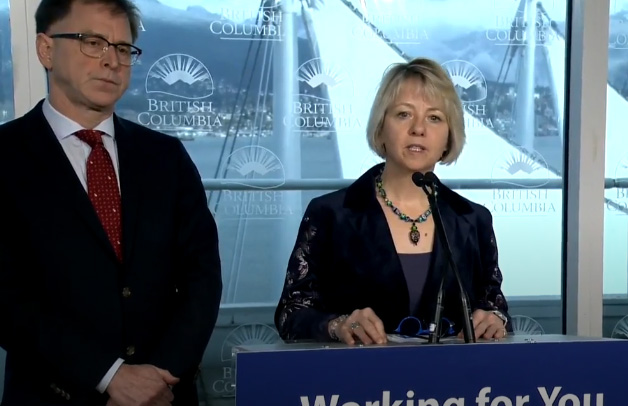
Today BC Health Minister Adrian Dix and Public Health Officer (PHO) Dr Bonnie Henry have now said: “We are asking all British Columbians to do their part to prevent the transmission of infections in our communities and in our health-care system to help protect everyone in BC.”
“We continue to be in this phase of being high vigilant, watching carefully, and making sure people who are sick who have travelled at all are tested and isolated,” said Dr Henry. “We want everybody to take the actions that we need to keep our communities and families safe. And even if you haven’t travelled and you’re sick, keep way from others and stay to yourself,” she said, while emphasizing the need for frequent handwashing, cough/sneeze hygiene, and staying home if you have cold/flu-type symptoms.
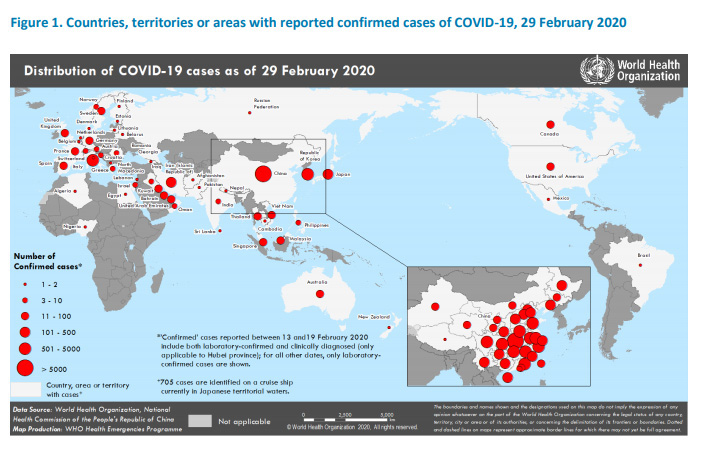
As of early morning February 29 (Pacific Time), globally there are 85,403 confirmed cases of COVID-19, with more new cases (1,318) reported outside of China than within (435). Of all confirmed cases, 79,394 (92.96%) are in China (with 2,838 deaths), with 6,009 confirmed cases outside of China in 53 countries (86 deaths). The WHO risk assessment is now Very High worldwide (previously only China was risked as ‘Very High’).
PROVIDING INFORMATION TO THE PUBLIC: Many health officials and medical doctors (as interviewed on various national TV news broadcasts in the USA and Canada) have been promoting the idea of full reliable information to the public. Downplaying any messaging about the need to be prepared is ultimately to shortchange communities that wish to know enough in order to do their best.
What may be different in 2020 compared to even a few years ago, is that people see and utilize information as made available worldwide via the Internet. And it might be said that people in Canada and other western nations would rather be thoughtfully informed than given only pieces of the picture. Gaps in information could more likely lead to problems than having adequate and useful information.
It’s possible that funding and high-level policy interpretation has slowed things down in the initial phases of responding to COVID-19 since December 2019 (including the release of information to the public), but with some coordinated leadership by the WHO (which itself was cautious in initial releases) western nations are picking up steam and fortifying their skilled and ready Centres for Disease Control and local levels of health authority.
ROLE OF MEDIA: The WHO articulated in a report on February 26 about the role of media: “Yours is a critical role. This is the time for accurate reporting from official sources. Your role in an outbreak is not simply to chase the story; it is to perform a public service. Your actions are public health actions in every respect. You play a significant part in protecting the health and well-being of your fellow citizens,” it was stated by Dr Hans Kluge, WHO Regional Director for Europe.
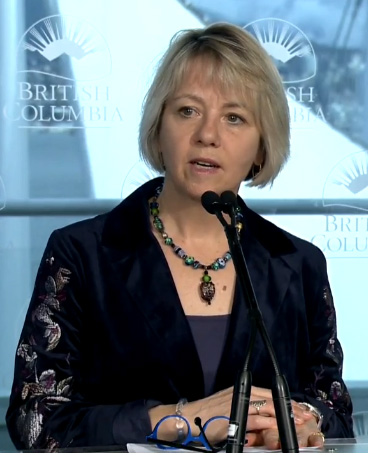
In today’s February 29 news conference by BC Minister of Health Adrian Dix and Public Health Officer Dr Bonnie Henry announced the eighth case of COVID-19 in BC. The person affected is visiting from Tehran, Iran and arrived in British Columbia earlier this week. The patient is in isolation at home with support and monitoring from public health teams.
“The individual has been confirmed positive based on BC Centre for Disease Control (BCCDC) testing. The individual is female, in her 60s and is staying with family in the Vancouver Coastal Health region,” it was stated by Dix and Dr Henry in Vancouver this morning, and stated in a BC Health news release. The first four people in BC with cases of COVID-19 have all recovered, said Dr Henry. The other three cases are in stable condition, she said.
“Vancouver Coastal Health is actively investigating. Close contacts have been identified and contacted by public health officials. Those who may be at risk are now in isolation for 14 days and are being actively monitored for symptoms,” said Dr Henry.
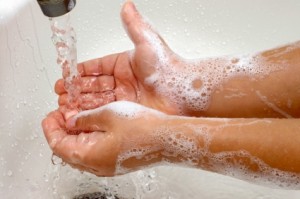
Dix and Dr Henry reported that three additional patients who previously tested positive for COVID-19 are now fully recovered, for a total of four fully recovered patients. The other individuals continue to recover in isolation at home and under the care of public health teams. The BCCDC has completed testing on 1,425 samples for 1,012 individuals as of February 27, 2020.
“While the risk of spread of COVID-19 within British Columbia remains low at this time, we continue to focus efforts on containing and delaying the spread of transmission, as well as preparing for the possibility of a pandemic. A pandemic is the spread of an illness to a large number of people on a global scale,” said Dr Henry.
“We are asking all British Columbians to do their part to prevent the transmission of infections in our communities and in our health-care system to help protect everyone in BC.”
“Similar to how you may need to care for someone with influenza, you want to ensure you have sufficient food, medications and support in place to stay home for a number for days.
“Employers should increase cleaning and hand hygiene availability, in addition to thinking about how they will manage absenteeism through steps such as remote working or virtual meetings.
“The most important measures people can take today is to proactively prevent the transmission of respiratory illnesses, including COVID-19. This includes cleaning your hands regularly, avoiding touching your face, coughing or sneezing into your elbow sleeve and disposing of tissues appropriately. It is also very important to stay home and away from others if you or your family are sick.
“British Columbians with upcoming travel plans should continue to monitor the Government of Canada travel site for the latest travel advisories: https://travel.gc.ca/travelling/health-safety/travel-health-notices/210
While it’s obvious, this was stated today as Canadians adjust to the realities of global travel: “Travellers should understand that as global efforts to contain COVID-19 continue, the availability of health-care services in some areas may be limited and travel restrictions may be put in place suddenly,” said Dr Henry.
“We ask all international travellers who are returning to BC to monitor themselves and their children closely for symptoms. If any symptoms arise, limit their contact with others and connect with their primary care provider, local public health office or call 811 to determine if COVID-19 testing is needed. This is an important way to reduce the possibility of transmission of illness to others.”
THE WORK OF PUBLIC HEALTH: WHO has been encouraging public health authorities around the world to become acquainted with an follow best practices.
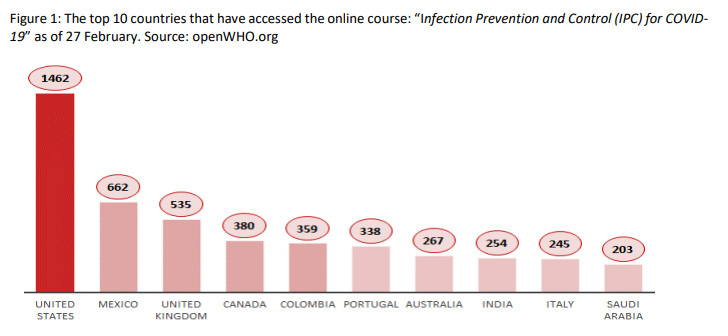
The top 10 countries that have accessed the online course (by login count): “Infection Prevention and Control (IPC) for COVID19” as of February 27 are USA, Mexico, United Kingdom, Canada, Columbia, Portugal, Australia, India, Italy and Saudi Arabia.
==== BC LINKS:
Technical detail and updates on COVID-19 on Twitter
@CDCofBC or at BC Centre for Disease Control
For recommendations on protecting yourself and your community, visit: https://news.gov.bc.ca/files/BG_Coronavirus_Recommendations.pdf


